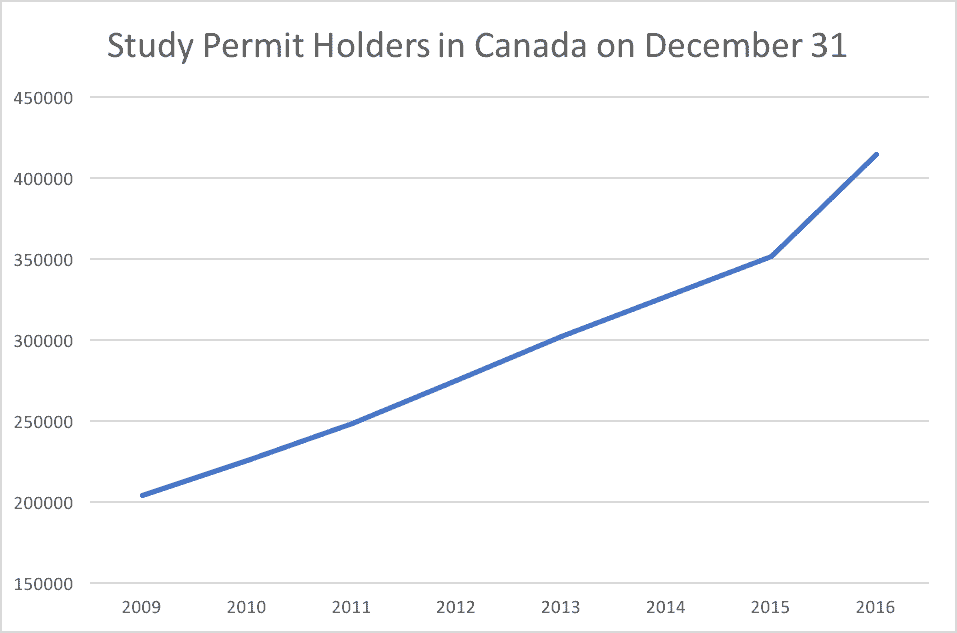 September 20, 2017 – The number of international students holding Canada study permits has more than doubled since 2009, the latest Immigration, Refugees and Citizenship Canada figures show.
September 20, 2017 – The number of international students holding Canada study permits has more than doubled since 2009, the latest Immigration, Refugees and Citizenship Canada figures show.
At the end of 2016, there were just over 414,200 study permit holders in Canada, up from just over 204,000 seven years ago.
The figures also show a significant increase of nearly 63,000 study permits between 2015 and 2016 alone. A sharper increase is forecast for 2017, with universities reporting significant increases in intake numbers following Donald Trump’s victory in the U.S. presidential election.

Source: Immigration, Refugees and Citizenship Canada
Before Trump’s election, universities were already seeing steady increases in interest from overseas students. But the controversial Republican’s October 2016 victory saw a significant spike. Although 2017 numbers are not yet available, universities are reporting they will be higher than ever.
Canada’s top two universities for numbers of international students – the University of Toronto and the University of British Columbia – have reported significant increases in numbers of their foreign cohort.
Toronto welcomed nearly 17,500 international students in 2016 at both undergraduate and postgraduate level. This figure represents 20 per cent of the total number of students at the university.
Compare this with 2007, when Toronto had 7,380 international students, or 10 per cent of the total population.
Livestream Video: How International Students Can Immigrate to Canada
In British Columbia, which has the second highest number of international students in Canada, numbers rose to nearly 14,500 in 2016, compared with just over 9,100 in 2012.
When Trump was elected, the first indication of increased interest came with university websites being swamped with traffic, both from the U.S. and overseas. It now seems the interest boost is resulting in a new influx of international students to Canada.
Traditionally, America has dominated the market for international students. Other players include the U.K., where ongoing Brexit negotiations mean the country’s economic future is uncertain.
With two key competitors for international students in delicate political positions, Canada is benefitting.
China remains the key market for international students, with citizens of the Far East country making up a third of the total Canadian cohort in 2016. Indians, South Koreans, French and Americans round off the top five nationalities.
Top 5 Countries of Citizenship of International Students in Canada, 2016
| 1 | China | 131,830 |
| 2 | India | 76,320 |
| 3 | South Korea | 21,270 |
| 4 | France | 20,695 |
| 5 | USA | 12,865 |
Source: Immigration, Refugees and Citizenship Canada
Canada recently opened several new visa processing centres in China, to facilitate the arrival of more visitors and international students. Justin Trudeau also moved to post former immigration minister John McCallum to China as the Canadian ambassador. This indicates how important Canada sees its relationship with the Chinese.
Meanwhile, Canada has set about making it easier for international students to remain in the country and achieve permanent residence after they graduate. It was McCallum who described international graduates as ‘blue chip new permanent residents’ when he was in charge at IRCC.
At the federal level, the government has introduced points under Canada Express Entry. In November 2016, Comprehensive Ranking System points were added for three-year post secondary, master’s, professional degrees and doctorates (30 CRS points) and post-secondary diplomas lasting one or two years (15 CRS points). No points are awarded for a Canadian high school education or below. This gives many graduates the extra push they need to achieve a coveted Invitation to Apply.
The federal government and relevant provinces also promote the Atlantic Immigration Pilot, which includes a category aimed at international graduates. It was introduced earlier in 2017 to try and reverse aging populations and shrinking labour markets in the Atlantic provinces of Nova Scotia, Newfoundland & Labrador, New Brunswick and Prince Edward Island.
Read More
Livestream Video: How International Students Can Immigrate to Canada
Canada Offers International Graduates Attractive Pathway to Permanent Immigration
Canada Slashes Processing Time for Post-Graduation Work Permit Applications
Calling International Students: Here Are Canada’s Best Universities
In Quebec, the international graduate stream, which forms part of the Quebec Experience Program, is the only provincial program that offers permanent immigration to diploma and undergraduate degree holders, without a job offer.
The category imposes an advanced intermediate oral French requirement, but this stipulation is waived if half of the candidate’s studies are completed in Quebec and the qualification is recognized by the province. Candidates must either complete their studies in French or pass a French language test to transition to Canadian permanent residence.
The Ontario Immigrant Nominee Program runs a similar program without the need for a job offer, but it is aimed at Master’s and PhD graduates. The education requirement, therefore, is much more onerous, and the candidate must have English or French at Canadian Benchmark Level 7 or higher. The Ontario Master’s and PhD streams are open periodically throughout the year.
International students can already qualify to work in Canada after graduation by applying for a Post Graduate Work Permit. Here they can gain valuable Canadian work experience through a special work permit issued for the length of the study program, up to a maximum of three years. The work experience could then be used to qualify for permanent residence, through one of the above avenues.
Post Graduate Work Permit Requirements:
- Studied full time in Canada in a program of at least 8 months duration.
- Graduated from a public post-secondary institution, a private post-secondary institution, or a private institution authorized by provincial statute to confer degrees.
- Submit an application for a work permit within 90 days after receiving written confirmation of completing a study program.
- Received notification of eligibility to obtain a degree, diploma or certificate.
- Possess a valid Canada study visa or Canada study permit.
Interested employers: Kindly contact us here to receive further information.
Interested candidates: Find out whether you qualify to Canada by completing our free on-line evaluation. We will provide you with our evaluation within 1-2 business days.
Read more news about Canada Immigration by clicking here.




